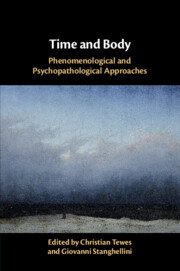Book contents
- Time and Body
- Endorsements for Time and Body
- Time and Body
- Copyright page
- Dedication
- Additional material
- Contents
- Figures
- Contributors
- 1 Introduction – Time and Body
- 2 Time, the Body, and the Other in Phenomenology and Psychopathology
- Part I Body and Time: General Aspects
- Part II Grief and Anxiety
- Part III Borderline Personality and Eating Disorders
- Part IV Depression, Schizophrenia, and Dementia
- 13 Intrinsic Temporality in Depression
- 13.1 Commentary on “Intrinsic Temporality in Depression: Classical Phenomenological Psychiatry, Affectivity, and Narrative”
- 14 Lost in the Socially Extended Mind
- 14.1 Commentary on “Lost in the Socially Extended Mind: Genuine Intersubjectivity and Disturbed Self-Other Demarcation in Schizophrenia”
- 15 Closing Up
- 15.1 Commentary on “Closing Up: The Phenomenology of Catatonia”
- 16 Embodied Selfhood and Personal Identity in Dementia
- 16.1 Commentary on “Embodied Selfhood and Personal Identity in Dementia”
- Index
- References
13 - Intrinsic Temporality in Depression
Classical Phenomenological Psychiatry, Affectivity, and Narrative
from Part IV - Depression, Schizophrenia, and Dementia
Published online by Cambridge University Press: 30 October 2020
- Time and Body
- Endorsements for Time and Body
- Time and Body
- Copyright page
- Dedication
- Additional material
- Contents
- Figures
- Contributors
- 1 Introduction – Time and Body
- 2 Time, the Body, and the Other in Phenomenology and Psychopathology
- Part I Body and Time: General Aspects
- Part II Grief and Anxiety
- Part III Borderline Personality and Eating Disorders
- Part IV Depression, Schizophrenia, and Dementia
- 13 Intrinsic Temporality in Depression
- 13.1 Commentary on “Intrinsic Temporality in Depression: Classical Phenomenological Psychiatry, Affectivity, and Narrative”
- 14 Lost in the Socially Extended Mind
- 14.1 Commentary on “Lost in the Socially Extended Mind: Genuine Intersubjectivity and Disturbed Self-Other Demarcation in Schizophrenia”
- 15 Closing Up
- 15.1 Commentary on “Closing Up: The Phenomenology of Catatonia”
- 16 Embodied Selfhood and Personal Identity in Dementia
- 16.1 Commentary on “Embodied Selfhood and Personal Identity in Dementia”
- Index
- References
Summary
Studies of depression indicate the existence of temporal abnormalities, particularly as related to the perspectival and agentive aspects of lived experience in persons who undergo depression. With reference to these anomalies, there is a long-standing view in phenomenological psychopathology, reinforced by empirical studies, that depression involves a disruption of “intrinsic temporality.” This view is widely incorporated into contemporary enactivist approaches to cognition, which link such a disruption to disorders involving affect, affordances, and narrative aspects of experience. We argue that classical phenomenological accounts of temporal abnormalities in depression do not warrant the supposition of a disruption to “intrinsic temporality,” and that this term itself is ambiguous. Instead, we understand depressive experience primarily in terms of affectivity, which does indeed feedback into the experience of lived time. Our view demonstrates a deeper consensus between phenomenological psychopathology and “4E” approaches, including work on both Gibsonian affordances and narrative, than is typically recognized.
Keywords
- Type
- Chapter
- Information
- Time and BodyPhenomenological and Psychopathological Approaches, pp. 289 - 310Publisher: Cambridge University PressPrint publication year: 2020

